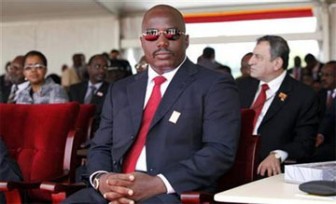KINSHASA (Reuters) – Three months after one of the world’s most expensive elections, the Democratic Republic of Congo has no parliament or new government and its people are beginning to wonder what has become of their publicity-shy president, Joseph Kabila.
Never one to seek out the media gaze, Kabila has rationed his public appearances even more tightly since chaotic November polls that secured him victory but failed to hand a workable parliamentary majority to his party allies.

Congo’s body politic is mired in tortuous negotiations to form the next ruling coalition, concern over a possible power vacuum is troubling the Congolese and frustrating investors keen to push on with resource projects in the central African state.
“Because the government is not in place, there is no work and people aren’t being paid,” complained resident Joseph Oleko, as he picked his way through a scrap metal market in the sprawling capital Kinshasa.
“I don’t know what Kabila is waiting for … He has to talk, he has to be visible, because he’s the head of the nation.”
The November 28 elections were billed as the moment when Congo could finally show it had shaken off the legacy of a 1998-2003 war that killed 5 million and begin to offer its 70 million-plus people some hope of a better future.





